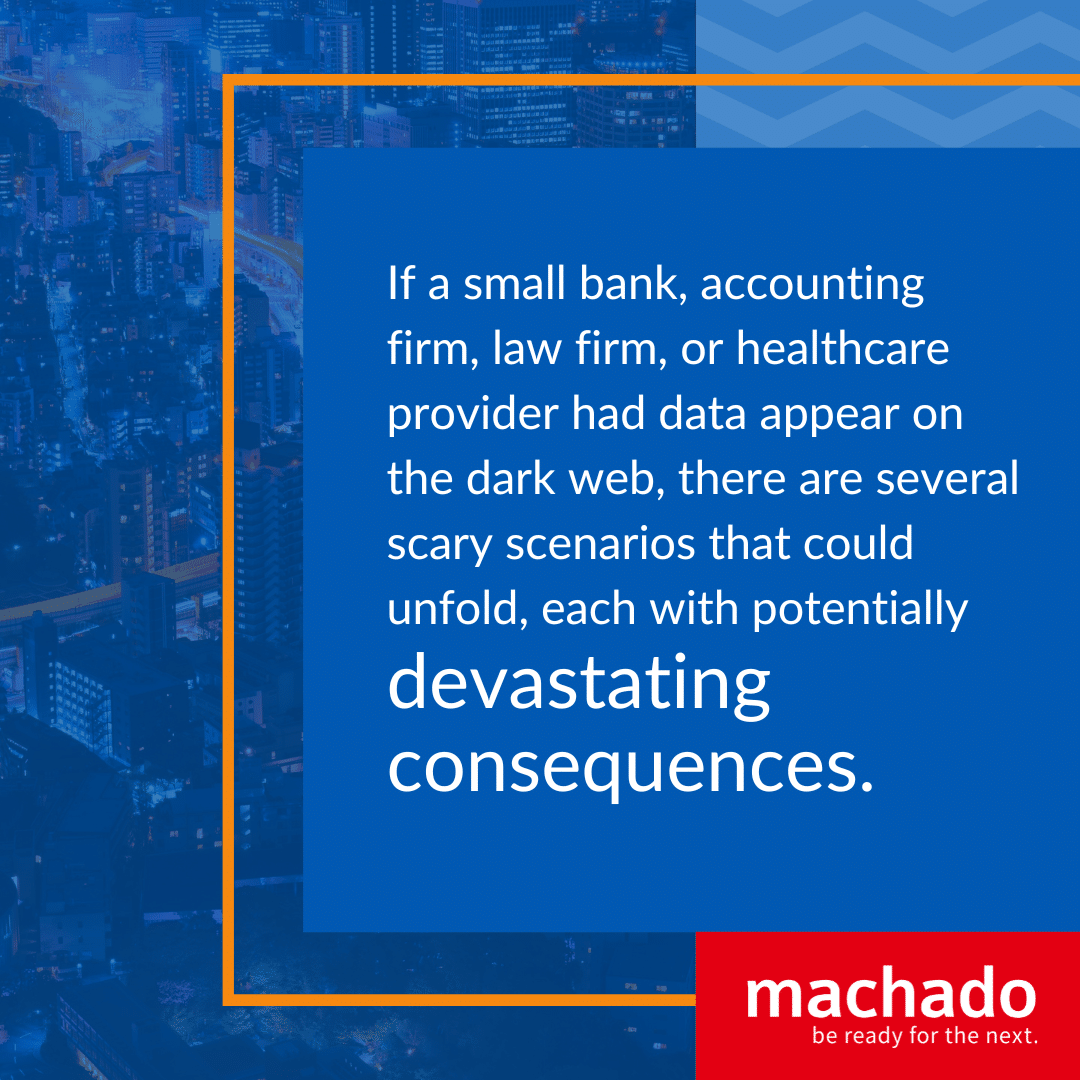TL;DR: The presence of sensitive data on the dark web is a clear indicator of a serious security breach. It underscores the necessity for robust cybersecurity measures, regular security audits, employee training in data protection, and an effective incident response plan to mitigate the risks and reduce the impact of such breaches. This article defines the dark web, shares some very real examples of how the dark web was used to hurt businesses (and customers) and what you can do to protect your company and employees from nefarious actors.
We don’t often get “negative” here at Machado. As a proactive MSP, we tend to take a positive approach to getting ahead of issues before they become real problems.
However there is a mounting threat coming, and we’re doing everything we can to help companies here in Massachusetts protect themselves.
I’m talking about something that’s lurking in the shadows of the internet – the dark web.
You’ve probably heard about it before, but what exactly is it?
And more importantly, why should you, your business, and your employees be cautious about it?
The Dark Web: A Hidden Menace
Imagine a place online where anonymity reigns supreme. That’s the dark web. It’s a part of the internet hidden from regular search engines and requires special software, like the Tor browser, to access.
While it’s not all bad news and can be a haven for privacy, it’s also a breeding ground for some shady, even illegal, activities.
Why Should Massachusetts Businesses Be Concerned About the Dark Web?
Is the dark web a real threat to businesses in Massachusetts?
Absolutely!
With certainty, information that is stolen during a data breach very well might end up for sale on the dark web.
Let’s look at some chilling examples of data breaches from the last year or two that COULD show up on the dark web (starting with one in our backyard):
Shields Healthcare Group Data Breach: This Massachusetts-based medical services provider suffered a massive data breach, affecting about 2.3 million people. Sensitive patient information was compromised, highlighting the risks of cyberattacks in the healthcare sector.
Now before we look too closely at what happened, let’s be clear. It can be difficult to tell if data, once stolen, will show up on the dark web.
However:
To quote one source, “Shields points out that to date it has “no evidence to indicate that any information from this incident was used to commit identity theft or fraud.” But no one should take any comfort from this statement. Nearly every public breach notice will make this claim, but it is way too early to know whether medical fraud or financial identity theft will occur. The data will likely be sold on the dark web to another group, or an individual, who may use it now, or later. This kind of identity information takes years to expire.”
To summarize what happened:
In 2023, Shields Healthcare Group, a Massachusetts-based provider specializing in medical imaging and surgical services, experienced a significant data breach. The breach, involving unauthorized access to their systems, was discovered following suspicious activity indicating a potential data compromise. Although the precise method used by the attackers remains uncertain, possibilities include exploiting a software weakness or a phishing attack.
The attackers accessed an extensive range of sensitive patient data, including full names, Social Security numbers, dates of birth, addresses, medical diagnoses, billing and insurance information, and other critical medical details. This breach affected approximately 2.3 million individuals, with its impact extending to 56 facilities partnered with Shields, thereby affecting numerous patients and their data.
In response, Shields Healthcare Group promptly initiated containment measures, including a comprehensive investigation aided by forensic specialists and system security enhancements. They also embarked on reviewing the affected data and began notifying individuals and regulatory bodies. As part of their ongoing efforts, Shields committed to bolstering their data security measures and protections to prevent future incidents.
But not everyone has Shields Healthcare Group’s resources.
Right now, as a proactive MSP, we’re offering a Free Dark Web Scan for your business. Don’t wait until it’s too late – get ahead of these threats and protect your business and employees today!
Other Data Breaches that Could Land in the Dark Web:
MOVEit Data Breach: The MOVEit Transfer software was hit hard by a ransomware gang. Over 1,000 organizations and 60 million individuals were affected. This breach showed that even software solutions could become vulnerabilities.
JumpCloud Data Breach: An identity and access management firm faced a breach from a nation-state actor. This targeted attack underscores the need for tight security, especially for companies managing user access and data.
Topgolf Callaway Data Breach: Over a million customers of this US golf club manufacturer had their personal data compromised. It’s a stark reminder that any industry, even sports, isn’t safe.
Duolingo Data Breach: Even the popular language-learning platform wasn’t spared, with data of 2.6 million users leaked. This shows how widespread and varied cyber threats can be.
These are a few specific examples of data breaches. However, for professional services firms and financial institutions, the story could get a little scarier.
The Dark Web and the Threat to Professional Services
If a small bank, accounting firm, law firm, or healthcare provider had data appear on the dark web, there are several scary scenarios that could unfold, each with potentially devastating consequences. For example:
Financial Fraud and Identity Theft (Small Bank): If your bank’s customer data appears on the dark web, it could lead to widespread financial fraud. Hackers might access account numbers, passwords, and personal identification information to steal funds, create fake accounts, or commit identity theft. Customers could lose their life savings, and the bank could face massive financial losses and legal liabilities.
Compromised Client Confidentiality (Law Firm): For a law firm, the confidentiality of your client information is paramount. If sensitive legal documents, such as case strategies, personal information of clients, or privileged communications, were leaked, it could undermine legal cases, violate attorney-client privilege, and ruin the firm’s reputation. Clients may lose their cases, face public embarrassment, or suffer financial losses due to leaked information.
Tax Fraud and Financial Mismanagement (Accounting Firm): If your accounting firm’s data were leaked, it could result in tax fraud and financial mismanagement for its clients. Sensitive financial information, like income, investments, and tax records, could be exploited for fraudulent activities. Clients could face IRS audits, legal issues, or financial ruin. The firm itself could be held liable for breaches, face lawsuits, and lose its credibility.
Patient Privacy and Healthcare Fraud (Healthcare Provider): A healthcare provider experiencing a data breach could lead to serious violations of patient privacy. Medical records, treatment plans, and personal health information could be used for healthcare fraud, insurance scams, or even blackmail. Patients could suffer from misdiagnoses, incorrect treatments, or have their personal health information used against them. The healthcare provider could face HIPAA violation penalties, lawsuits, and a loss of trust from patients.
Operational Disruption and Loss of Trust: In all these cases, the affected organization would likely face operational disruptions. Investigating the breach, addressing legal and compliance issues, and rebuilding their cybersecurity infrastructure could be costly and time-consuming. There’s also the intangible cost of lost trust from clients, customers, and the public, which can be far more damaging and harder to recover from.
Extortion and Ransom Demands: In some cases, cybercriminals use the stolen data for extortion. They may demand ransom from the organization in exchange for not releasing the sensitive data publicly or to other malicious parties.
The dark web is no joke, and its impacts can be far-reaching. By staying informed and taking the right precautions, you can shield your business from these hidden dangers.
Continue reading to better understand the dark web, and learn how you can help make cybersecurity a priority and keep Massachusetts businesses safe and secure!
Unveiling the Dark Web
The dark web is like the hidden layer of the internet, not visible to the average user and not indexed by standard search engines. To access it, one needs special software, like the Tor browser. This secretive nature is what makes the dark web both intriguing and potentially dangerous.
The Risks to Your Firm, Clients, and Employees
While the dark web can offer many benefits, those can quickly become negatives when used by bad actors to attack businesses or their customers. Here are a few areas that make the dark web such a threat.
Anonymity: The dark web thrives on anonymity, which, while great for privacy, unfortunately, also attracts unsavory activities.
Illegal Activities Galore: It’s infamous for all sorts of illegal dealings – think drugs, weapons, and, crucially for you, the trade of stolen data.
Data Breaches and Cyber Threats: Your firm probably handles sensitive client data. Imagine if this information ended up on the dark web. The consequences? Legal nightmares, financial losses, and a tarnished reputation.
Ransomware and Malware Central: The dark web is also a marketplace for malicious software. These can lock your data or entire systems, demanding a hefty ransom for their release.
Phishing Scams and Fraud: The dark web provides tools that trick your employees into revealing confidential information, leading to breaches and financial losses.
Employee Exposure: If your employees wander into the dark web, even by accident, they might expose your network to serious risks.
Reputation at Stake: Just being associated with a data breach linked to the dark web can erode your clients’ trust in your ability to protect their information.
Fortifying Your Defenses from Dark Web Threats
So, what can you do to shield your business from these hidden dangers?
If you think your business data might be exposed on the dark web, you can get a free scan today.
Robust Cybersecurity Measures: It’s not just about having antivirus software. Think firewalls, intrusion detection systems, and regular security updates.
Employee Training: Regularly educate your team on the best cybersecurity practices. Awareness is your first line of defense.
Data Protection and Monitoring: Implement strong data encryption and continuous monitoring of your networks.
Regular Security Audits: Have experts regularly check your systems for vulnerabilities.
Collaborate with Cybersecurity Experts: Sometimes, it’s best to bring in the big guns – cybersecurity professionals who can provide specialized protection.
Protect Your Business Against Dark Web Related Threats Today!
Don’t wait for a breach to happen. As a proactive MSP, we’re offering a Free Dark Web Scan for your business. It’s a simple yet effective way to start protecting your business, clients, and employees from the lurking dangers of the dark web.
Remember, staying informed and prepared is not just a choice, but a necessity for every business. Secure your firm against the shadowy threats of the dark web and stay a step ahead in the cybersecurity game!
Download our guide to learn how you can get more done with your current IT staff.Be Ready for the Next IT Opportunity







